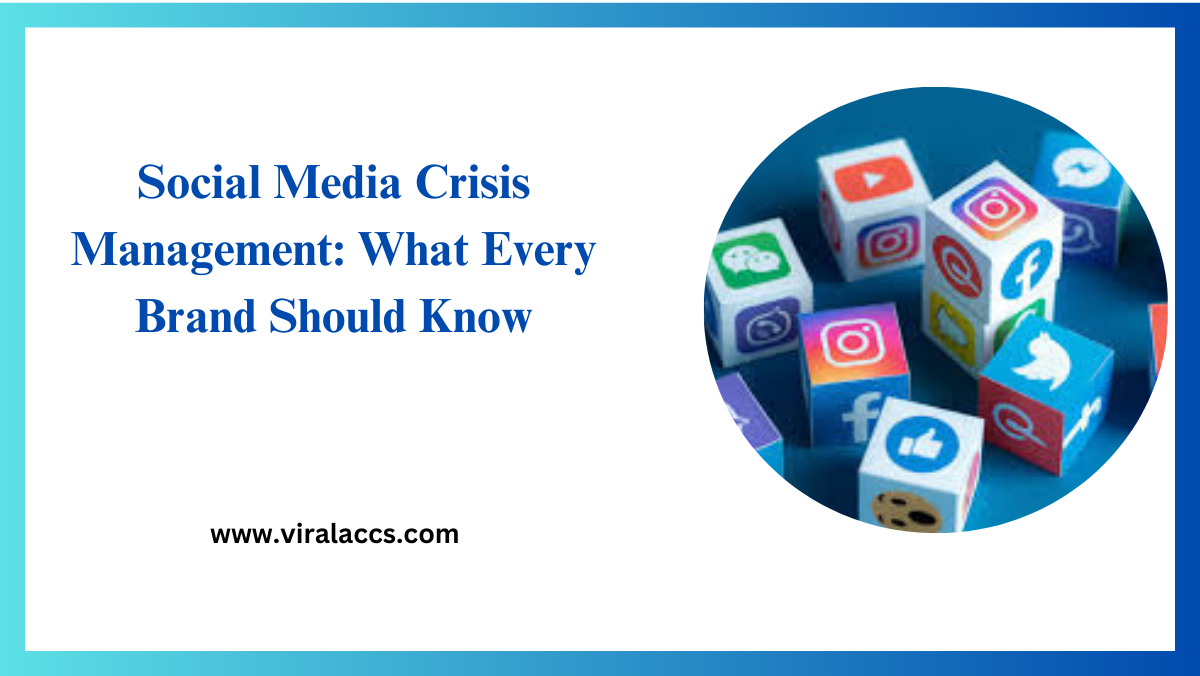In the digital age, where every tweet, post, and comment can go viral within minutes, brands must be prepared to handle social media crises efficiently. The online world is as unpredictable as it is powerful, and a single misstep can spiral into a full-blown crisis that tarnishes a brand’s reputation. This guide will walk you through everything you need to know about social media crisis management, ensuring that your brand remains resilient and credible even under fire.
Understanding the Importance of Crisis Management in Social Media
Crisis management in social media is not just about damage control. It’s a vital strategy for maintaining trust and credibility with your audience. A well-prepared brand can turn a potential disaster into an opportunity to demonstrate transparency and commitment to its values.
When a crisis hits, your immediate response can determine how it’s perceived by the public. An effective crisis management plan enables you to address issues promptly, minimizing negative impacts while reinforcing your brand’s integrity. Ignoring or mishandling a crisis, on the other hand, can amplify the problem, leading to long-term damage.
Today’s consumers are more informed and vocal than ever. They expect brands to act responsibly and respond swiftly to any issues. Therefore, understanding and implementing effective crisis management strategies is not just beneficial—it’s essential for any brand operating in the social media space.
Recognizing Common Types of Crises Brands Face
While no two crises are identical, they often fall into a few common categories. By recognizing these, brands can better prepare for potential challenges and develop targeted strategies for handling them.
- PR Disasters Due to Miscommunication
One of the most frequent crises arises from miscommunication. A poorly worded tweet or an ill-timed post can spark outrage and lead to significant backlash. Brands must maintain a consistent and thoughtful voice across all platforms to prevent such slip-ups.
Instances where information is misconstrued or taken out of context can quickly escalate. To mitigate this, ensure that all communications are clear and aligned with your brand’s values. Having a review process in place can help catch potential issues before they go live.
Training your team on effective communication and providing guidelines for social media interactions can also reduce the risk of PR disasters, fostering a more controlled and cohesive brand message.
- Customer Complaints and Negative Feedback
Negative feedback is inevitable, but how a brand responds can make all the difference. When complaints arise, it’s crucial to address them promptly and professionally to show customers that their concerns matter.
Ignoring negative comments or responding defensively can exacerbate the situation. Instead, acknowledge the issue, apologize if necessary, and offer a solution or compensation. This approach not only resolves the immediate problem but also demonstrates your brand’s dedication to customer satisfaction.
Encourage open communication with your audience by providing easy ways for them to reach out with their concerns. This proactive stance helps build trust and can even turn dissatisfied customers into loyal advocates.
- Security Breaches and Data Leaks
In an era where data is king, security breaches and data leaks pose a severe threat. Such incidents can erode trust and lead to legal ramifications if not handled correctly.
To safeguard against these crises, invest in robust cybersecurity measures and regularly audit your systems for vulnerabilities. In the event of a breach, act swiftly to inform affected parties and implement corrective actions.
Transparency is key when dealing with security breaches. Communicate openly with your audience about what happened, what steps you’re taking to address it, and how you plan to prevent future occurrences.
Steps for Effective Crisis Management
Preparation is your best defense against a social media crisis. By following these steps, you can create a comprehensive crisis management plan that equips your brand to handle any challenge.
- Establish a Crisis Management Team
Having a dedicated team in place is crucial for effective crisis management. This group should include representatives from communications, legal, and other relevant departments to ensure a well-rounded response.
Assign clear roles and responsibilities within the team to streamline decision-making during a crisis. Regular training sessions and simulations can help keep the team sharp and ready to act swiftly.
Empower your team to make decisions independently when necessary, ensuring that they have the authority and resources needed to respond effectively in high-pressure situations.
- Develop a Crisis Communication Plan
A crisis communication plan outlines how you’ll communicate with stakeholders during a crisis. It should include pre-approved messaging templates, contact lists, and protocols for escalation.
Identify key spokespeople who will represent your brand publicly and provide them with media training to handle tough questions. This preparation ensures that your brand’s message remains consistent and credible throughout the crisis.
Regularly review and update your plan to reflect any changes in your organization’s structure or external environment. A flexible, up-to-date plan is more effective in navigating the unpredictable nature of social media crises.
- Monitor Social Media Channels
Real-time monitoring of your social media channels is essential for early detection of potential crises. Use tools like Hootsuite or Sprout Social to track mentions and sentiment, enabling you to address issues before they escalate.
Set up alerts for keywords associated with your brand and industry to stay informed about any emerging trends or conversations. This proactive approach allows you to engage with your audience and manage your brand’s reputation more effectively.
Engage with your audience regularly, responding to comments and messages promptly. This ongoing interaction helps build a positive rapport and can prevent small issues from spiraling into crises.
Learning from Past Crises
Analyzing past crises can provide valuable insights and help you improve your crisis management strategies. By understanding what went wrong and what worked, you can better prepare for future challenges.
- Case Study Analysis
Review case studies of other brands that have faced similar crises. Analyze their responses and outcomes to identify best practices and potential pitfalls.
Draw lessons from both successful and unsuccessful crisis management efforts. This balanced approach can help you refine your strategies and avoid common mistakes that have tripped up other brands.
Apply these insights to your own crisis management plan, adapting them to fit your brand’s unique needs and circumstances.
- Conducting Post-Crisis Evaluations
After a crisis has been resolved, conduct a thorough evaluation of your response. Gather feedback from your crisis management team and other stakeholders to identify areas for improvement.
Document the entire crisis management process, including timelines, actions taken, and outcomes. This record serves as a valuable resource for future reference and can help inform updates to your crisis communication plan.
Celebrate successes and acknowledge any shortcomings. By fostering a culture of continuous improvement, your brand becomes more resilient and better equipped to handle future challenges.
- Implementing Improvements
Based on your evaluations and analysis, implement improvements to your crisis management plan. This iterative process ensures that your strategies remain effective and relevant in an ever-changing digital landscape.
Regularly update your plan with new insights and technologies to keep it aligned with industry best practices. Encourage ongoing training and development for your crisis management team to maintain their skills and preparedness.
By continuously refining your approach to crisis management, you empower your brand to respond confidently and effectively to any situation that arises.
Conclusion and Insights
Social media crises are inevitable in today’s fast-paced digital world. However, with the right strategies and preparations in place, your brand can weather the storm and emerge stronger.
By understanding the importance of crisis management, recognizing common types of crises, and following effective management steps, you can protect your brand’s reputation and build trust with your audience.
Learning from past crises and continuously optimizing your crisis management plan ensures that your brand remains resilient and adaptable in an unpredictable environment.
Take proactive steps today to develop and refine your crisis management strategies. By doing so, you empower your brand to confidently tackle any challenges that come its way, securing your place as a trusted leader in your industry.








